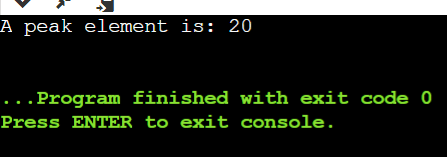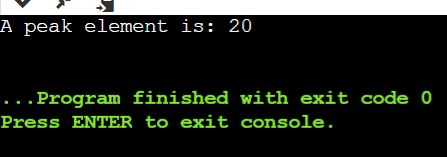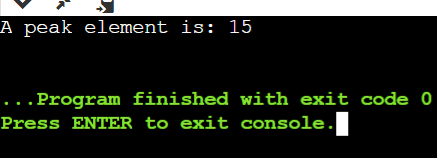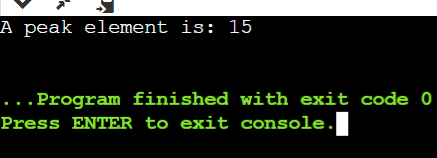Finding a Peak Element in an Array in C++Elements that are larger than the elements next to them are called peak elements in an array. They can be very important in many different applications, such as dataset identification or algorithm optimization. In this article, we will learn how to find a peak element in an array in C++. What are Peak Elements?An element in an array that is greater than or equal to its neighbours is called a Peak element. According to this definition, an array may have more than one peak element, and it may be useful to locate any one of them depending on the situation. Depending on these parameters, the array may be sorted or unsorted, and different methods may be used to identify peak elements. Finding Peak Elements in an Unsorted Array:-Since finding peak elements in an unsorted array is a more general situation with intriguing issues, we will begin by talking about it. Naive Approach: Analyzing each element's neighbours while iterating over the full array is a primitive method of locating peak elements in an unsorted array. An element is considered to be peak if it is larger than its neighbours. Program: Let's take a C++ program to find a peak element in an array: Output: 
Using Binary Search Method:-Binary search is a more effective method. The time complexity of this method is O(log n). There are some following steps:
Program: Let's take a C++ program to find a peak element in an array using binary search method: Output: 
Finding Maximum Elements in a Sorted Array:-Finding the peak elements is not too difficult if the array is sorted either ascending or descending. A peak in an array sorted in ascending order:-
Here's a basic C++ implementation of that: Output: 
A Peak array sorted in a descending order:-
Here's where to look for it: Output: 
Conclusion:An intriguing topic with a wide range of applications is finding the peak element in an array. Identifying the peak elements in an array of depends on whether it is sorted or not. Binary search can be used to find an efficient solution in an unsorted array, although it is simpler in sorted arrays. Finding peak elements efficiently can be crucial for improving algorithms and finding solutions to issues in a variety of fields, including computer science and data analysis. Peak elements in C++ can be efficiently identified by grasping the ideas and techniques discussed in this article, regardless of whether you are working with sorted or unsorted arrays.
Next Topicforward_list::splice_after() in C++
|
 For Videos Join Our Youtube Channel: Join Now
For Videos Join Our Youtube Channel: Join Now
Feedback
- Send your Feedback to [email protected]
Help Others, Please Share









